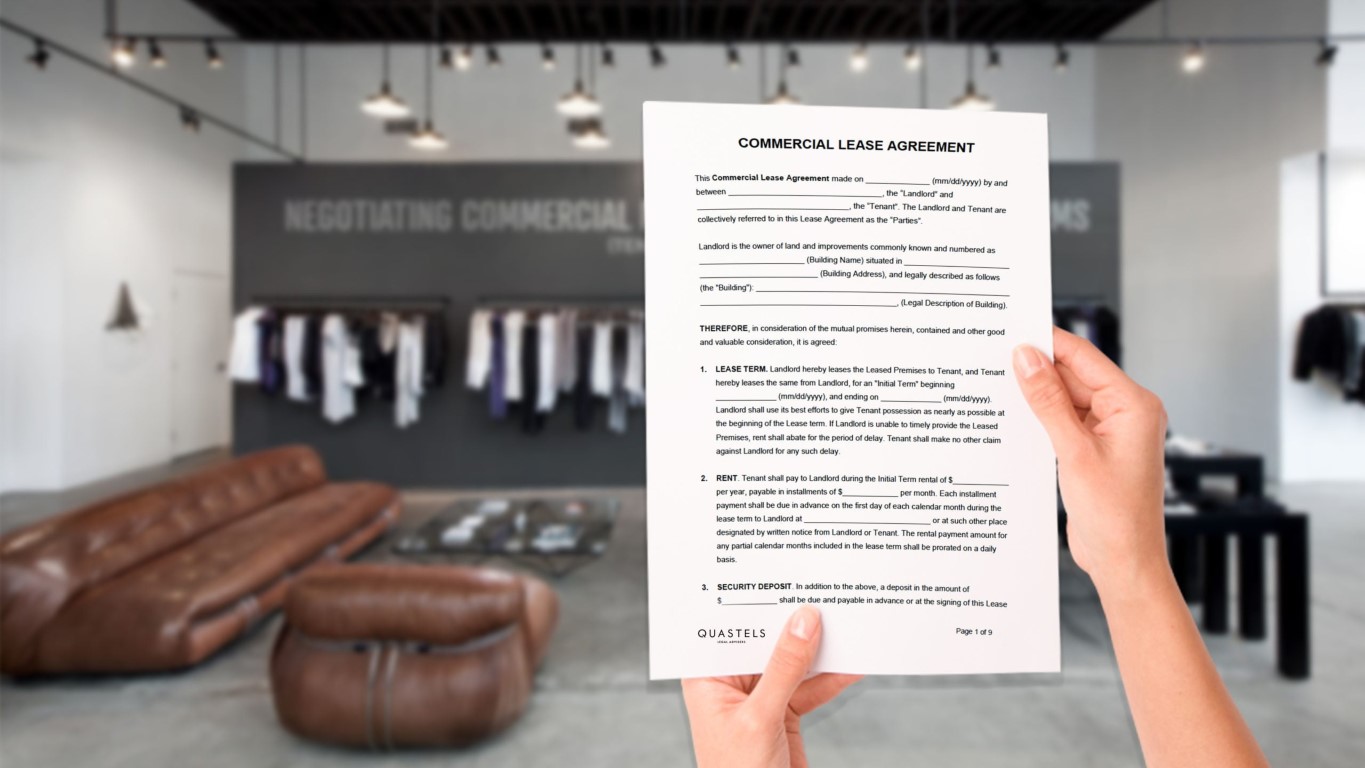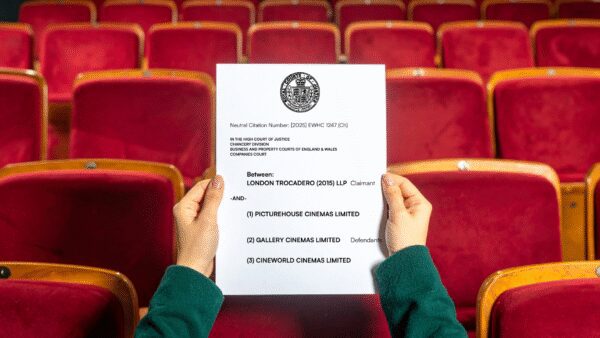Congratulations! You have found the perfect commercial property and cannot wait to sign the lease so you can move in and start trading. Most likely your new landlord will want to put in place Heads of Terms (HoTs) prior to the commercial lease agreement being drafted. In my experience, many tenants end up negotiating HoTs before instructing a Commercial Property Solicitor.
If you find yourself in this situation, below are certain factors you need to look out for/be aware of when examining and negotiating HoTs. But before getting into the details of HoTs, let me briefly explain what they actually are.
What Are Heads Of Terms?
HoTs (sometimes referred to as “heads of agreement,” “memorandum of understanding,” or “letter of intent”) is a document which outlines the main points of a proposed commercial agreement or transaction between two or more parties before it is finalised. It acts as a precursor to a formal contract and, in terms of a commercial lease, its main purpose is to:
- Provide clarity to all parties involved about what has been agreed upon in principle.
- Serve as a basis or blueprint for drafting the final commercial lease agreement.
- Help in identifying and resolving potential issues during negotiations by forcing parties to put down in writing their understanding and expectations.
Once Solicitors are instructed, they will work from the agreed HOTs in drafting the final Lease, so it is important that the HOTs are accurate, reflect everything agreed and include everything you require in order to run your business from the premises.
Are Heads Of Terms Legally Binding?
Although heads of terms are typically non-binding, they may contain certain legally binding provisions, such as confidentiality clauses or exclusivity agreements.
This is one area in particular where tenants who are not engaging a Commercial Property Solicitor must tread carefully. Your landlord may be a company or a person with a substantial portfolio of commercial properties and may have a Solicitor advising them on the HOTs.
If this is your first commercial tenancy, chances are that you will be disadvantaged in terms of experience and negotiating power. Not only can seeking legal advice ensure your best interests are protected in terms of the provisions that are included in the HoTs, it can also mitigate the risk of uncertainty over whether or not you or the landlord intended to be legally bound by the whole document or by particular terms within the document and potentially save you money in the long run.
If you are not taking advice for a Solicitor, it is best to make sure the HOTs are specifically expressed to be “subject to contract”.
What Should A Head Of Terms Document Contain?
It is crucial that HoTs for a commercial property lease include key details that the landlord and tenant have agreed upon in principle. Although the content might vary depending on the type of property, the parties involved, and the nature of the intended lease, the following are typical terms that may be included (with some pointers to consider):
Read Full Head Of Terms Document Recommendations
- The names and details of the landlord and the tenant.
- A detailed description of the property being leased, including its address, size, any specific parts of the property being leased (e.g., specific floors or units), and any associated rights (for example parking).
- Duration of the lease, including the start and end dates and any break clauses (see below).
- Amount of rent, frequency of payments, any rent-free periods, and provisions for rent reviews or increases. Are you required to pay VAT on rent and other sums?
- Details concerning any security/ rent deposit required, its amount, and conditions for its return.
- Responsibilities for repairs and maintenance of the property and the rest of the building.
- Whether fitting out works are permitted and any restrictions on alterations throughout the term. Consider whether you need a rent free period whilst the fitting out works are carried out (as you are unlikely to be trading during this time). Also consider whether you need planning permission for works or use of the property and if the lease should be conditional upon you obtaining this.
- Details about any service charges, what they cover, and how they are calculated and reviewed (see below).
- Who is responsible for insuring the property and to what extent (this should usually be the Landlord).
- What the property can be used for (e.g., office space, retail, industrial) and any restrictions on its use.
- Conditions under which the tenant can assign the lease or sublet the property (are any restrictions acceptable to you?).
- Who bears the costs of the lease negotiation and preparation. This is up for negotiation however tenants should push for each party to be responsible for their own legal costs. It can get costly if the tenant is required to cover the landlord’s legal costs as well as their own (and also results in less motivation for the landlord to conclude matters quickly as they will not need to be concerned with legal costs increasing)
- Conditions that must be fulfilled before the lease can be formally entered into (for example, repairs/ works to be carried out by the landlord, planning permission which the tenant requires).
- Provisions regarding the confidentiality of the negotiations and whether the landlord agrees not to negotiate with other prospective tenants for a specified period.
- An expected timetable for progressing to a formal lease, including any key dates or milestones.
- Any other terms or conditions that are specific to the particular transaction.
- Whether security of tenure applies (see below).
Although all the above points are important, there are several key issues to be particularly aware of when negotiating the terms of the lease before the formal commercial lease agreement is drafted, including (for example):
Security Of Tenure
If your commercial lease has the benefit of security of tenure, you have a statutory right under the Landlord and Tenant Act (LTA) 1954 to renew your lease on similar terms when your original tenancy expires. A landlord can only refuse to renew the lease under very limited circumstances set out in the LTA1954, such as:
- There have been breaches of covenants.
- Suitable alternative accommodation is available.
- The landlord intends to redevelop the site.
- The landlord intends to occupy the premises.
It is possible to contract out of security of tenure provisions which means that you will have no right to stay in your business premises when the lease comes to an end. You will also have no right to any compensation for losing your business premises. Even if the Landlord were to offer you a new lease at the end of the term, the terms would need to be re-negotiated and the Landlord would be in a strong position if they knew it was important to you to remain in the premises.
If you are thinking of excluding security of tenure from the HoTs and ultimately the commercial lease, make sure you seek legal advice from an experienced Commercial Property Solicitor. It could be a particular problem for you if you are carrying out expensive fit out works or if the premises themselves are critical to your business plan.
Full Repair and Insurance
One of the most common questions I receive from commercial property tenants is “What does an FRI lease mean?” FRI stands for full repair and insuring lease. It means that any costs associated with repairs and insurance of the property fall to the tenant.
However, what many commercial property tenants do not realise is that if they sign up to an FRI lease, they will be responsible for carrying out all repairs to the property itself and contributing to all repairs carried out at the building through the service charge. This can result in unexpected costs of hundreds or even thousands of pounds. There is usually a large amount of discretion in a lease as to what a landlord can include in the service charge.
To protect your interests, you should consider the following:
- amending the repairing obligation in the HoTs so you are required to hand the property back to the landlord at the end of the lease in no better but no worse a condition than it was in the day the lease began. At the start of the lease a detailed photographic schedule of condition should be prepared, agreed with the landlord, and then annexed to the lease (make sure you agree who will be covering the cost of this).
- Agreeing a service charge cap so that there is a cap on how much you can be required to pay towards the service charge each year (this will usually rise each year in line with inflation)
- Asking for inherent defects at the property to be excluded from your repairing obligations and inherent defects at the rest of the building to be excluded from the service charge.
- Including the service charge estimate for the initial period so there are no surprises.
Break Clause
Circumstances can swiftly change, and you may find a few years into your tenure that your current property is no longer fit for purpose. A break clause is a term in the lease that allows the landlord, tenant, or both to end a lease early without facing a penalty. This can provide you with the flexibility you need to grow or re-align your business.
You should consider whether the break clause is tenant only or mutual. Landlords are likely to insist on any break clause being mutual which means that they will have the same right as you to end the lease early.
You should also consider the conditions attached to any break clause. The only conditions which should be accepted are:
- All undisputed sums paid up to date.
- Property returned free from any occupation.
Conditions for vacant possession or no breach of tenant’s covenants (whether material or not) should NOT be accepted as these are likely to make the break clause almost impossible to exercise by the Tenant.
Final Words
Although it is possible to negotiate HoTs for a commercial lease without legal advice, it is always best to instruct an experienced Commercial Law Solicitor to check the document and ensure your best interests are protected, especially if this is the first time you have taken on a commercial tenancy.
The money you invest in quality legal advice may pale in comparison to agreeing to Heads of Terms in which you do not fully understand the consequences. Remember, once HOTs are agreed in principle, it is much harder to negotiate at a later date once you have taken Solicitor’s advice. It is almost always more cost effective to negotiate the terms BEFORE the HoTs are finalised.
To discuss any of the points raised in this article, please contact Naomi Jones or fill in the form below.









